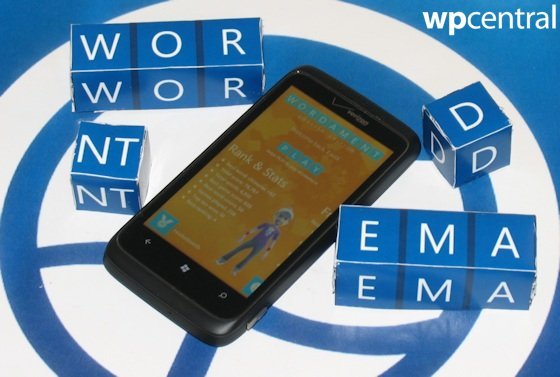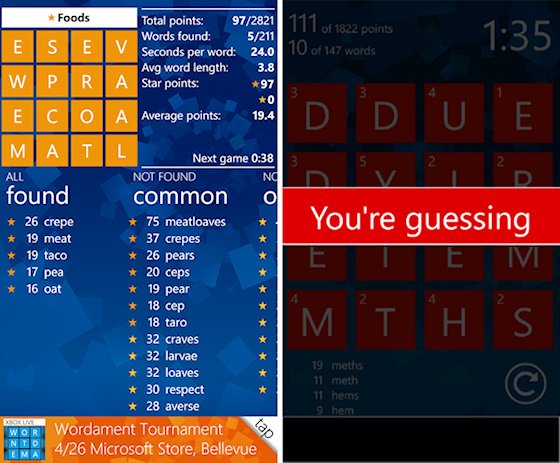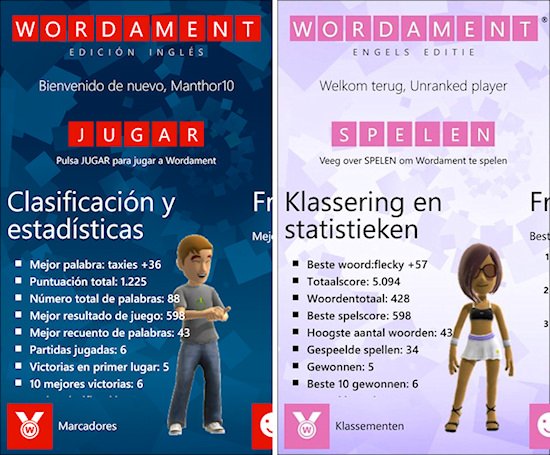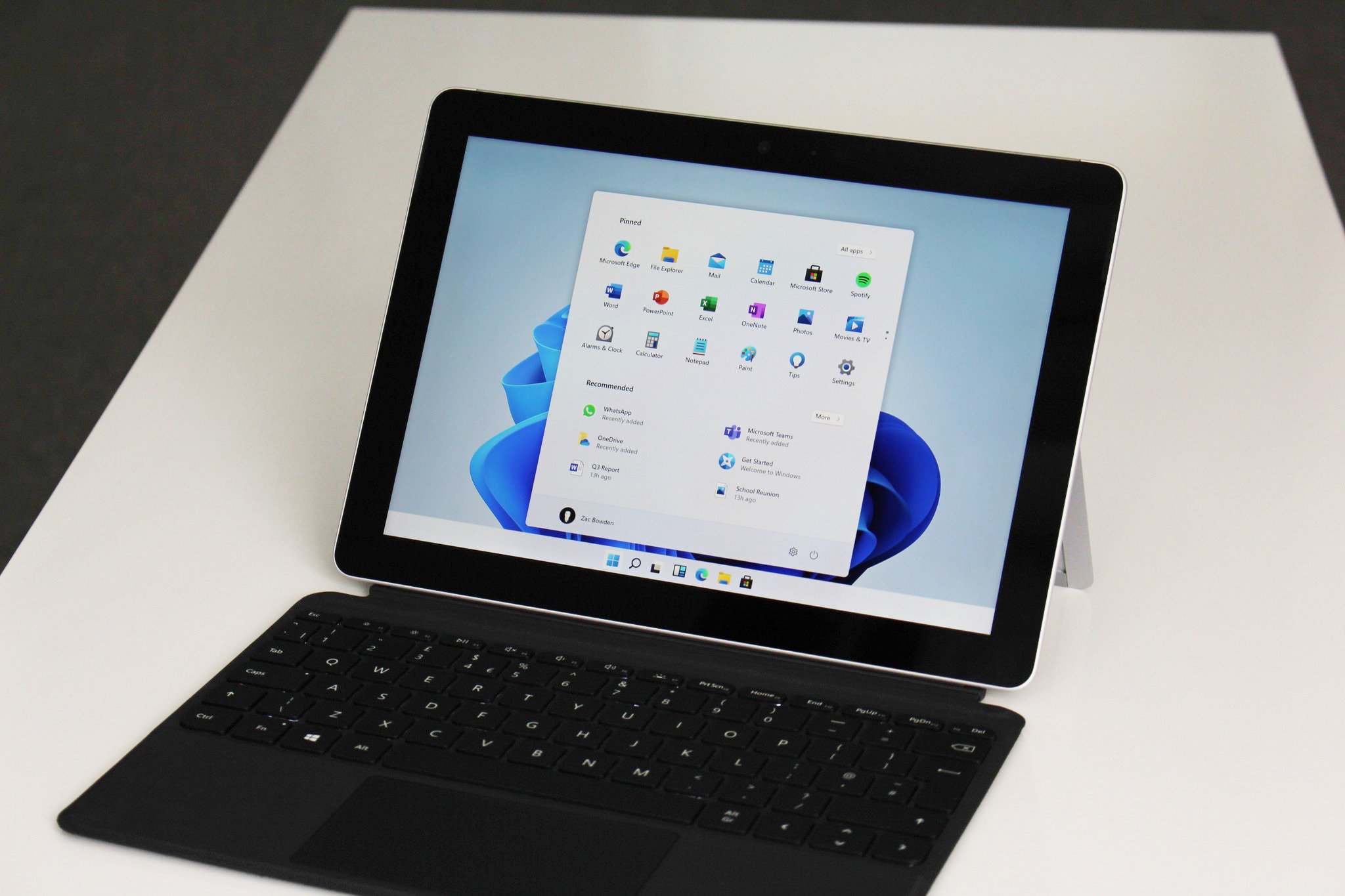Windows Phone Xbox Live Review: Wordament
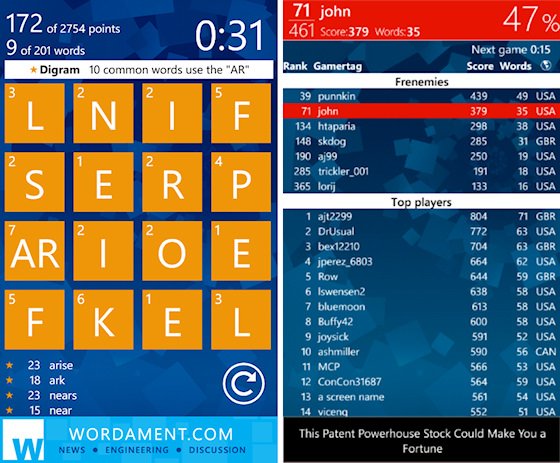
Windows Phone has long been host to a number of quality word games, but they were all indie titles rather than Xbox Live ones. In fact, all the good indie word games even boasted multiplayer features, something long and inexplicably missing from mobile Xbox Live games. Of those indie standouts, one reigned supreme: Wordament, from a developer called You vs. the Internet. As it turns out, You vs. the Internet is a side project of a couple of Microsoft employees. Once Microsoft saw how well Wordament turned out, they made the wise decision to publish the game and bring elevate it to Xbox Live status. Wordament truly deserves all the visibility it can get, because it happens to be one of the finest and most addictive games on the platform.
One versus many
First off, Wordament is a free, ad-supported game. Unlike previous free Xbox Live games, this one actually requires an internet connection (Wi-Fi or cellular) to play. Why? Well, Microsoft doesn’t make money if you don’t see ads. But more importantly, Wordament is built around a massively multiplayer component and live-scheduled games. Xbox 360 owners who experienced the now-defunct 1 vs. 100 game a few years ago should be familiar with Wordament’s multiplayer setup. Both games broadcast specific challenges to all players simultaneously; each person’s performance is then ranked leaderboard-style. Wordament differs from 1 vs. 100 in one major way: games take place all day, every day. You can play as much as you want – hop in, take on a few rounds, and quit when you’re ready.
Mind-boggling
Wordament plays a lot like an MMO version of Boggle. Each round, the game presents a four by four grid of 16 letters. Players then madly scramble to find as many words as possible by touching and connecting sequentially adjacent letters. In other words, each letter in any given word must be adjacent (touching) the letter that came before it, horizontally, vertically, or diagonally. Naturally, you can only ‘find’ each word once per round – try to spell the same word out again and the letters turn yellow. Variations on a word: singular and plural, present tense and past tense, etc. count as separate words though. Spell a word that isn’t in the game’s dictionary (proper nouns and abbreviations are prohibited) and the letters turn red. Guess wrongly too many times in a row and you’ll lose the ability to input words for a brief time, Butterfingers.
Wordament differs from Boggle in many ways beyond the number of simultaneous players. For one thing, rounds last only two minutes instead of three. More significantly, both games have different scoring systems. Boggle simply awards points by the number of letters in each word, regardless of the actual letters. Wordament uses a Scrabble-style system in which each letter has a point value based on its rarity. It adds the value of each letter to assign the word’s final point value. Words with four or five letters get a 1.5x bonus, six or seven letters 2.0x, and 8+ letters 3.0x.
Special rounds
All the latest news, reviews, and guides for Windows and Xbox diehards.
Special rounds affect scoring as well. Every few games, a Diagram or Themed puzzle pops up, signified by a sound effect at the start of the round. Digram tiles have two letters instead of one, such as –er or –at. Words spelled with these tiles get an extra scoring bonus. The number of possible digram words remaining is displayed at the top of the screen, creating an optional objective besides just hunting for points. Find them all (never easy) and you’ll get an Achievement. Themed puzzles look identical to normal ones, but offer scoring bonuses for finding words based on a specific theme like fairy tales or sports words. Locating every word in a themed set unlocks its own Achievement, too.
Rosetta stone
In case special rounds didn’t add enough variety already, Wordament even features alternate languages to play with. As of this writing, the in-game dictionary can be switched to Spanish or Dutch (both in beta form), with more languages on the way. People who speak English as a second language will benefit the most when their native languages are offered, but any multilingual person should enjoy playing in his or her own second language.
Between rounds
45 seconds elapse between teach two minute game. This down time has two distinct phases highlighting the results of the previous round. For the first half, you can browse some personal stats like number of words found and average word length. At the bottom, two columns list of the words you found, as well as high-scoring words you didn’t find. Tapping any of these words will demonstrate how it can be located on the letter grid.
After a few seconds, the results screen shifts to the leaderboard for the last round. At the top, your position number is displayed as a fraction, with the denominator representing the total number of players for that game. Below that, the leaderboard is divided into up to three categories: Frenemies, Top players, and Players near your rank. The latter two are self-explanatory and show about 15 GamerTags a piece.
The Frenemies feature greatly enriches Wordament’s competitive aspect by making it more personal. I may not care a lot about how I compare to a sea of faceless names, but I do care about beating my friends! Any Xbox Live friends that played during the same round as you will automatically show up on the Frenemies list, making it easy to see how you stacked up. You can also tap on names from anywhere on the Leaderboard to make someone your Frenemy.
Improving the downtime
Wordament does a fair job of keeping players interested during the downtime of the results screens, but it still has room for improvement. For one, I see no reason why we shouldn’t be able to switch back and forth between the first results screen and the leaderboard. Sometimes I might be more interested in studying the word lists than who played during a round. In fact, for some people the leaderboard phase may seem like enforced boredom.
Second, the multiplayer nature of the game is somewhat undermined by the complete inability to communicate with other players. Obviously messages from random players would be obtrusive, but I wish we could message our friends. Sure, the time between rounds is brief, but at least give us the option.
Finally, the timer that counts down to the start of the next round on the leaderboard page is small and easy to miss while browsing GamerTags. As a result, I often find myself thrust into a match slightly unprepared. The developers should really implement a countdown sound effect (like the one that plays at the end of a round) to the results screen as well.
Achievements
As much as I love Wordament, I’m not crazy about its Achievements. Four or five of them will be forever out of reach of most players: Digram master, Theme titan, Win the hour, World champ, and You’re on top of the world. Finding all the digrams and theme words is tough - if only we could specifically choose to play special rounds... The other three problem Achievements are Leaderboard related and require an extreme level of skill at minimum. World champ in particular has a bunch of needless extra requirements (as detailed here) that aren't even listed in the Achievement description - not cool. All told, I fear that only a handful of players will get the top spots and hold onto them, basically preventing other people from attaining those Achievements.
Overall Impression
Wordament is simply an exceptional game. You vs. the Internet has built on the foundation of a classic word game and reached new heights with their multiplayer component, scoring system, and special rounds. Not only is it super hard to put Wordament down once started, but we don’t even have to pay for it, either. This is truly Windows Phone’s first killer app, with the potential to catch on just as much as Draw Something or Words with Friends. Microsoft already plans to bring Wordament to Windows 8, where it will undoubtedly find huge success. This in turn could lead to Wordament becoming a selling point for Windows Phone – but only if it stays exclusive to Microsoft platforms.
Get Wordament here on the Marketplace.

Paul Acevedo was formerly a Games Editor at Windows Central. A lifelong gamer, he has written about videogames for over 15 years and reviewed over 350 games for our site. Follow him on Twitter @PaulRAcevedo. Don’t hate. Appreciate!
